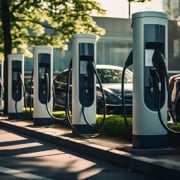U.S. Senate Advances Bipartisan Infrastructure Package
This week, the U.S. Senate advanced a much-anticipated bipartisan infrastructure bill. After months of negotiations and a failed procedural vote last week, the White House and a bipartisan group of Senators unveiled a bipartisan infrastructure deal to provide $550 billion in new spending on July 28. That same day, in a 67-32 vote, 17 Republicans joined all 50 Democrats to invoke cloture on the motion to proceed to the bill. Today, the Senate passed another bipartisan procedural vote to officially consider the bill on the Senate floor. While the Senate continues to work on finalizing the legislative text, the following topline funding provisions were released:
- $110 billion in investments that largely stem from the Senate’s surface transportation reauthorization bills, providing funds for roads, bridges, and major projects
- $73 billion for the Senate’s Energy Infrastructure Act, including funds to modernize the electric grid; support critical minerals and supply chains for clean energy, carbon capture, hydrogen, direct air capture, and energy efficiency; and provide an advanced manufacturing and recycling tax credit
- $66 billion for passenger and freight rail upgrades and expansions
- $65 billion for broadband affordability and infrastructure
- $55 billion for the Senate’s Drinking Water and Wastewater Infrastructure Act as well as dedicated funds to replace lead pipes and service lines and to address per- and polyfluoroalkyl substances (PFAS)
- $50 billion for resiliency and western water infrastructure, including funding for cybersecurity investments to address critical infrastructure needs, waste management, flood mitigation, wildfire, drought, ecosystem restoration, and weatherization
- $39.2 billion for public transit, including funds to address the repair backlog and provide accessibility improvements for the elderly and disabled
- $25 billion for airport improvements
- $21 billion for environmental remediation to clean up Superfund and brownfield sites, reclaim abandoned mines, and cap orphan gas wells
- $17.3 billion for ports and waterways infrastructure
- $11 billion for transportation safety programs, including a new Safe Streets for All program to reduce highway and pedestrian accidents and fatalities
- $7.5 billion for a national network of electric vehicle charging stations as well as hydrogen, propane, and natural gas fueling infrastructure
- $7.5 billion for electric buses and low-carbon buses and ferries, including hydrogen fuel cells, liquified natural gas, and other alternative fuel technologies
In general, the next step in the legislative process will include votes on amendments — potentially as early as this weekend. Senate leadership will need to carefully consider which amendments receive a vote in order to preserve adequate support for the bill as another vote of at least 60 Senators will be necessary to end debate on the bill. Senate passage of the bill remains uncertain at this stage.
We will continue to monitor the legislative process and review of legislative text, including amendments, as it becomes available. More details to come in our next post.
This post is as of the posting date stated above. Sidley Austin LLP assumes no duty to update this post or post about any subsequent developments having a bearing on this post.


